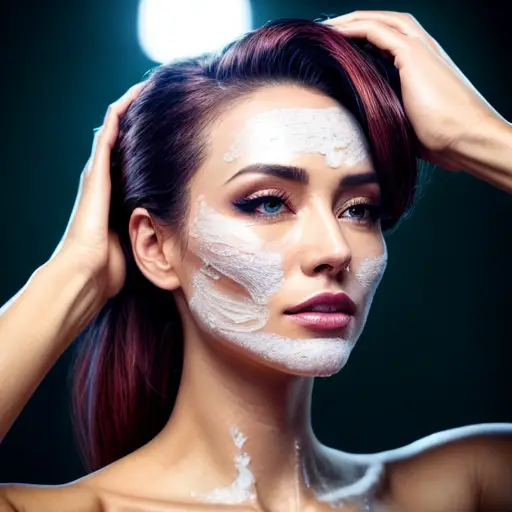The Art of Skincare: Understanding the Science Behind Product Incompatibilities
Picture this: you're standing in front of your bathroom mirror, armed with an arsenal of skincare products, ready to conquer the world of flawless skin. But hold on, my friend, before you start slathering on every potion and lotion in sight, let's talk about the delicate dance of product incompatibilities. It's like a chemistry experiment gone wrong, but instead of a volcano erupting, your face might just stage a rebellion. Mixing certain skincare ingredients is like introducing your skin to a disastrous blind date – they just don't get along. So, let's avoid the awkward encounters, shall we? Remember, don't let your retinol and vitamin C play together, or your face might turn into a battlefield. And for the love of all things radiant, keep your exfoliating acids away from your niacinamide, unless you want your skin to throw a tantrum. Trust me, your face will thank you for this crash course in skincare compatibility.
Cautionary Combinations: Skincare Ingredients That Should Never Mix
An interesting fact about skincare products is that certain combinations should be avoided to prevent adverse reactions or reduced effectiveness. For instance, it is generally advised not to mix products containing retinol or alpha hydroxy acids (AHAs) with those containing vitamin C. This is because retinol and AHAs are typically used at night to exfoliate and promote cell turnover, while vitamin C is often used during the day for its antioxidant properties. Mixing these ingredients can cause irritation, redness, or even decrease the efficacy of both products. Therefore, it is important to carefully read labels and consult with a dermatologist to ensure the compatibility of skincare products for optimal results.
Imagine this: you're a skincare enthusiast, armed with an array of potions and lotions, ready to conquer the quest for flawless skin. But hold your horses, my friend, because not all skincare ingredients are meant to be mixed. It's like trying to force a cat and a dog to be best friends – it's just not going to end well. So, let's avoid the potential disasters, shall we? Don't even think about pairing your vitamin C with your benzoyl peroxide, unless you want a chemistry experiment on your face. And please, for the love of all things holy, keep your retinol and AHA/BHA exfoliants far, far away from each other, unless you want to unleash the wrath of irritated skin. Remember, skincare is all about finding the perfect harmony, so let's skip the cautionary tales and stick to the ingredients that play well together. Your face will thank you for this crash course in skincare compatibility.
The Risky Duo: Popular Skincare Products That Shouldn't Be Used Together

Picture this: you're a skincare aficionado, eagerly building your dream routine with all the popular products that promise to deliver flawless skin. But hold on, my friend, because not all skincare products are meant to be used together. It's like trying to mix oil and water – they just don't blend. So, let's talk about the risky duos that could potentially wreak havoc on your precious skin.
First up, we have the notorious combination of retinol and exfoliating acids. While both of these ingredients work wonders individually, using them together can be a recipe for disaster. Retinol, known for its skin-renewing properties, can already cause some sensitivity and dryness. When combined with exfoliating acids like glycolic or salicylic acid, it's like throwing fuel on the fire. Your skin might end up feeling raw, irritated, and looking like a tomato. So, let's give these powerhouses some space and use them on different days to avoid any unwanted drama.
Next on the list is the ill-fated pairing of vitamin C and benzoyl peroxide. Vitamin C is a superstar when it comes to brightening and evening out the skin tone, while benzoyl peroxide is a go-to for fighting acne. However, when used together, they can cancel each other out and render both ingredients ineffective. It's like trying to mix oil and vinegar – they just don't blend well. So, let's keep these ingredients separate and give them their own spotlight to shine.
Last but not least, we have the cautionary tale of niacinamide and vitamin C. Individually, these ingredients offer a plethora of benefits for the skin. Niacinamide helps to regulate oil production and minimize pores, while vitamin C brightens and protects against environmental damage. However, when combined, they can form a not-so-friendly duo that might cause flushing or redness. To avoid any potential clashes, it's best to use them at different times of the day or on alternate days.
Remember, skincare is all about finding the perfect balance and harmony for your skin. While these combinations may not be ideal, there are plenty of other products and ingredients that can work wonders for your skin. So, let's steer clear of the risky duos and focus on creating a skincare routine that brings out the best in your skin. Your face will thank you for it!
Navigating the Maze: Expert Tips to Avoid Skincare Product Conflicts
Fun fact: Did you know that mixing certain skincare products can actually do more harm than good? One combination to avoid is using products containing retinol and alpha-hydroxy acids (AHAs) together. While both ingredients are fantastic for improving skin texture and reducing signs of aging, using them simultaneously can cause excessive dryness, irritation, and even chemical burns. So, remember to give your skin some breathing space and alternate between these powerful ingredients to achieve the best results!
Navigating the world of skincare can sometimes feel like venturing through a confusing maze. With countless products and ingredients to choose from, it's important to know how to avoid skincare product conflicts. One key tip is to read the labels and understand the ingredients in each product. Look out for potential clashes, such as mixing retinol with exfoliating acids or combining vitamin C with benzoyl peroxide. Another expert tip is to introduce new products slowly and one at a time, allowing your skin to adjust and react before adding another product into the mix. And of course, when in doubt, consult with a skincare professional who can guide you through the maze and help you create a harmonious routine that brings out the best in your skin. By following these expert tips, you can confidently navigate the skincare maze and avoid any product conflicts that might leave your skin feeling less than fabulous.

